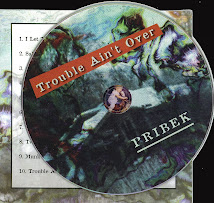 Feats don't fail me now!!
Feats don't fail me now!!One of the most important apocryphal works of the Second Temple Period is Enoch. According to the biblical narrative (Genesis 5:21-24), Enoch lived only 365 years (far less than the other patriarchs in the period before the Flood). Enoch "walked with God; then he was no more for God took him."
The original language of most of this work was, in all likelihood, Aramaic (an early Semitic language). Although the original version was lost in antiquity, portions of a Greek translation were discovered in Egypt and quotations were known from the Church Fathers. The discovery of the texts from Qumran Cave 4 has finally provided parts of the Aramaic original. In the fragment exhibited here, humankind is called on to observe how unchanging nature follows God's will.
The Book of Enoch is a pseudo-epigraphal work (a work that claims to be by a biblical character). The Book of Enoch was not included in either the Hebrew or most Christian biblical canons, but could have been considered a sacred text by the sectarians. The original Aramaic version was lost until the Dead Sea fragments were discovered.
character). The Book of Enoch was not included in either the Hebrew or most Christian biblical canons, but could have been considered a sacred text by the sectarians. The original Aramaic version was lost until the Dead Sea fragments were discovered.
Reference
Milik, Jazef. T., ed. The Books of Enoch: Aramaic Fragments of Qumran Cave 4 (Oxford, 1976) Printed book. General Collections, Library of Congress.
Antithesis:
Writers? Look HERE: Answering Christianity: Can the opposites be true? Invariably a writer looks to some pseudo-authority to cauterize his writing. I would avoid allowing Science to justify one's writing... why? Because it is lame. Speak rather from the heart of your own third person... no?
I really do not think all of this is just a sales job.
pd/mpaw
The original language of most of this work was, in all likelihood, Aramaic (an early Semitic language). Although the original version was lost in antiquity, portions of a Greek translation were discovered in Egypt and quotations were known from the Church Fathers. The discovery of the texts from Qumran Cave 4 has finally provided parts of the Aramaic original. In the fragment exhibited here, humankind is called on to observe how unchanging nature follows God's will.
The Book of Enoch is a pseudo-epigraphal work (a work that claims to be by a biblical
 character). The Book of Enoch was not included in either the Hebrew or most Christian biblical canons, but could have been considered a sacred text by the sectarians. The original Aramaic version was lost until the Dead Sea fragments were discovered.
character). The Book of Enoch was not included in either the Hebrew or most Christian biblical canons, but could have been considered a sacred text by the sectarians. The original Aramaic version was lost until the Dead Sea fragments were discovered.Reference
Milik, Jazef. T., ed. The Books of Enoch: Aramaic Fragments of Qumran Cave 4 (Oxford, 1976) Printed book. General Collections, Library of Congress.
Antithesis:
Writers? Look HERE: Answering Christianity: Can the opposites be true? Invariably a writer looks to some pseudo-authority to cauterize his writing. I would avoid allowing Science to justify one's writing... why? Because it is lame. Speak rather from the heart of your own third person... no?
I really do not think all of this is just a sales job.
pd/mpaw





No comments:
Post a Comment